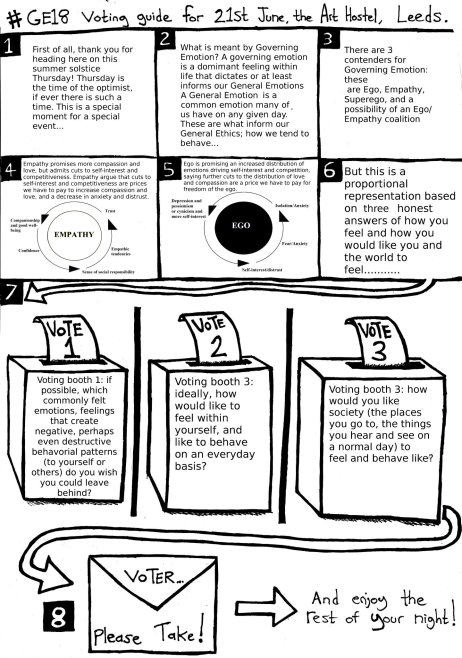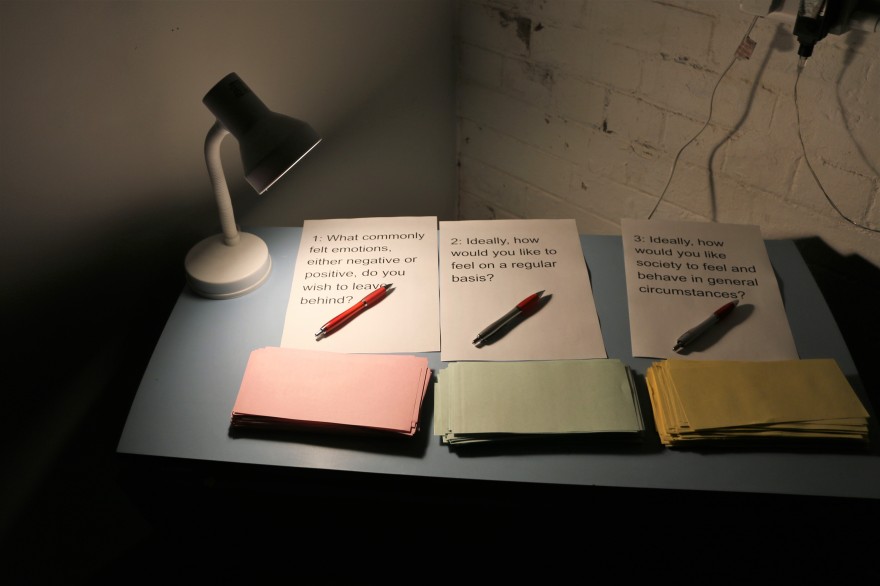2018 was the year when I had to ask the question the above title poses…
Neoliberal Me (An Exorcism of) and #GE18 (The General Election of Governing Emotions)

2008 to 2009 – I learnt a harsh lesson: devoting a year to mapping one’s inner and external fortified walls into one symbolic gesture (one which was nod to Pink Floyd’s concept album The Wall) cannot wish it into a transformative moment.

Surely only an idiot would expect such a ‘Big Other’ moment transforming their life? Surely only an emotional wreck, somebody who wasn’t thinking ‘rationally’, would expect an higher body to come down, wrest its hand on their head and suck out their demons?
Maybe, but apart from being ideologically-highly strung and being obsessed with the poetry of The Event, am I that different to everybody else? If we were fuelled by rational choices, devoid of the sense of higher powers, good and bad, fine-tuning the grand scheme of things, why did so many people reject the more ‘sensible‘ options offered by the Remainers and Hilary Clinton in those infamous 2016 elections?
Of course we can take the higher ground. Cathartically rage at the bigots and culturally uneducated who fucked it up for everyone else, totally ruining something that just needed ‘tweeking’ here and there… “They aren’t like us…”
But who’s side am I on? My heresy is that I was so so close to voting Leave back in June 2016, and mainly refrained from doing so due to knowing I couldn’t back up my reasons in ‘rational’ debate amongst my more educated friends. Equally, I felt hurt the next day when the supposedly most neutral news broadcaster in the UK presented people from my home town as at fault for the decision to leave the EU; clickbait for the educated to share and condemn these undeserving citizens.

I knew my reasons for almost voting leave, for wanting to press the ‘do not touch!’ button were deeply emotional. I knew that those feelings, personal to me, were also a justifiable reaction to the experience of the texture of life in this country 16 years into the 21st century. As the country became the most passionately divided and judgemental it had been for a generation, I saw people responding emotionally to their own experiences of the past.
Why am I focussing on this? Because it forced me to revaluate what sort of language my art practice was using. My work had always been explicit in showing my ill ease with life in an advanced capitalist world. But was it the fault of ignorant ( = bad) people for climate change? Were people who voted Tory my sworn enemies? Are the people going crazy on Black Friday personally to blame for the shame upon the human race? Are the people using derogatory terms in passing conversation inherently a set of scumbags?
What I have learned is that calling them so isn’t going to change their ways anyway…
7 years ago I would have rejected such a suggestion…
…but I’ve been pretty lost in those years since any youth-based substitute for confidence kept me airborne. I’ve become more at home sustaining sad-passions, drifting into dead-end pleasure-seeking. Although I’ve maintained a practice that I believe as depicted the experience of the past 10 years pretty fucking well, I’ve also been unable to find any positive to fix my identity on; my pride and self-worth has been non-existent, allowing my work only a reactive, compulsive, and inevitably fatalist response to contemporary lived experience. It became clear that I had no right to judge others on how they should and shouldn’t think and act.
But in 2018 I decided I didn’t want to be this shadow of a human being. Yet I also recognised that my practice could work through this.
Through the violence of language on and offline during the past 2 years I began to see trauma and lived-pain as the main things all the opposing sides had in common; ego’s formed out an entrenched sense of there being a need for self-preservation; hatred formed out of slow and sustained humiliation; nobody free from anxiety or bouts of mental ill-health.
I came up with two project proposals that were fundamentally one of the same: one a symbolic point of closure in my own life, and the other, a wager on the premise that what I was wishing to put a closure upon what was, to a large extent, a shared longing: a wager on the premise that many features of contemporary life pressure us into emotional states and behaviours that feed negative and unhealthy cycles and close down our receptiveness to the possibilities around.
I can roughly describe this as an endeavour to put into practice a recognition that emotional and social/political transformation go hand in hand.

I gave the introspective side the loaded, yet necessary name ‘Neoliberal Me (An Exorcism of)’. This work borrows from a body of work I have been developing over the past 5 years, in an attempt to but a closure on it – most notably, my work ‘the Mary Celeste Project (The Scene of The Crash), which I completed in 2014 , and ‘Stories From Forgotten Space’, a series of both psychogeographical and hauntological accounts that I made into a book.
The box in the work was ‘symbolically’ buried on the moors above where the work is largely focused (geographically-speaking), with its peaty mud it acquired giving it the look of something exhumed.
If it was a closure on a body of work which I would class as a kind of mourning process, of lost futures, both personal to me and socially felt, and greatly inspired by Mark Fisher’s works on hauntology, then the grossly oversimplified explanation of these recent projects is that were paying respect to the writers/friends who picked up the pieces of defiant optimism in Fisher’s later works before he took his own life; probably best encapsulated in the work on ‘Acid Communism’
But it was a post titled ‘A wager on a Shared Experience’ (since seemingly taken down) by an old friend who knew Fisher that gave punch-drunk emotions to a cause that was neither dogmatic or classifiable, but for something beautiful in the face of the ‘depressive realism’ Fisher critiqued so passionately.

I was apprehensive, burnt-out by the prospect of engaging in political debates over the Internet, that I wanted to speculate that by and large the majority of us shared a common experience of trauma adjusting to the fabric of contemporary life, that outweighed political standpoints, and that here was the appropriate ground upon which to propose that my wish for a symbolic act of closure on aspects of my life was a shared experience.
This became an event held on June 21st called ‘#GE18, the General Election of Governing Emotions’.
It was premised on the idea that there had been a mental health strike earlier in the year, born from a collective agreement to mentally withdraw from our libidinal economy, because the contemporary conditions were making it all but impossible to maintain good mental health. The ‘what if’ strike was trying to reimagine the theorist Franco Berardi’s jaded belief that ‘depressive withdrawal’ may be the only way to grind the contemporary capitalist system to a halt into a proactive moment of collective consciousness.
#GE18 was motivated by a wish to build a participatory practice that makes political conversations seem like they aren’t political by holding them up in empathic structures, that not only locate commonalities but also create a real space for idealism about our life and society.

The project was instigated by trying to put a call out for people to make cassette tapes based around their own take on a specific set of songs I held dear as ‘songs for my punch-drunk idealism’. I don’t have the most eclectic music taste, it is more one that is woven around my memories, ideals, lost futures. But I felt that others must surely have punch-drunk idealism songs; songs that [to use a line suggested by a friend] punch a hole in your heart that is both political and dogmatic/romantic; songs that put the fight back in you when life and times seem so dark. I asked participants to imagine making this cassette tape of personal moments as a gesture of good will to the nation for such an election night
The election night itself was held over two venues: Leeds Print Workshop and the Art Hostel, also in Leeds.
A series of prints wrangled with the difficulty of stepping into the unknown as personal and social transformation meet in political events, playing on the analogy of a cross roads point in a psychotherapy process: recognising we have the problem; that for the sake of ourselves and of others, we cannot carry on like this. However, the alternative seems far more frightening, because it is the unknown.
At the voting booths, people were given 3 votes. Which asked questions both of how they, and society feels, and how they would ideally like themselves and society to feel.


A good number of people attended, and the ‘votes’ are currently being typed up by a neutral source, to be revealed in some form in the next event to be staged by the Retro Bar at the End of the Universe, later this summer…
But what is the real result? If symbolic acts alone cannot be transformative, has anything been set in motion that is working towards empathic enabling? Both personally and politically there is a real desire to square a circle here, inside of which the symbolic moment still reigns supreme…
There is a deep struggle against waiting for the universe to align, it requires proactive development that years of aimlessness and what Fisher termed ‘reflexive impotence’ try to prevent at every move. Because we live in a neoliberal ‘ecology’, telling people to take responsibility of their own lives, and to ‘be the [fucking] change you want to see’, is received as a violent attack on ones negative ego that they’ve compromisingly had to build to survive such an hyper-individualist age. Even though such advice is delivered with empathic intent, it is received within this ecosystem as a right hook of one-upmanship.
The ghosts of yesterday’s near misses and own goals cannot be exorcised in one full swoop; the task is to challenge the stories they tell us as individuals and collectives. The symbolic exorcism was a wish to totally rid oneself of them. However, is a person banished of all ghosts nothing but a living blank?
Our ‘always on’ present relays these ghosts, even algorithmically sources the ghosts that retell the same stories. This isn’t to say there isn’t humongous transformative potential bursting at the seams in our hyperconnected age, yet the more potential the bigger the circle that needs squaring. It’s a huge task, because whilst ever the fabric of the present is so individualist, the challenge feels like a lonely one.
There isn’t a final outcome from these projects, there’s only an awareness that things (speaking more from a personal perspective here) cannot carry on like this, even as the resistance to change digs its heals further into the ground…



















Reblogged this on Punch-Drunk Utopianism.
LikeLike